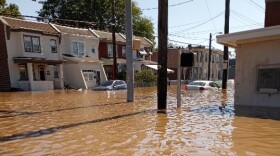Climate change brings more intense and more frequent heavy rain, particularly in the northeastern U.S.
The historic flooding in Wilmington earlier this month from the remnants of Hurricane Ida raised the question — should residents of Delaware’s largest city expect more floods of this magnitude in the future?
Delaware Public Media’s Sophia Schmidt talks with Gina Tonn, DNREC floodplain program manager and engineer, about changing flood risk.
Many were shocked by the flooding this month that affected hundreds of buildings and displaced dozens of families.
Gina Tonn, floodplain program manager and engineer at the Department of Natural Resources and Environmental Control, says overall, climate change does bring more precipitation to the region—but she’s not aware of any data that quantifies changing flood risk on the Brandywine specifically.
“I guess a study could be done,” Tonn said. “The things you’d have to think about is are there changes in land use in the watershed that might affect storm flows along the creek. You’d have to think about changes in the climate."
Residents near the creek can look at FEMA floodplain maps to gauge their flood risk, but these are based on historic risk and don’t reflect future climate change.
Tonn and other experts recommend residents look into getting flood insurance. Many people don’t realize that most homeowners and renters insurance does not cover flood damage and that even those outside the 100-year floodplain can get insurance.
New rates begin rolling out next month through FEMA’s flood insurance revamp, “Risk Rating 2.0.” The program is expected to make rates better reflect risk and reduce inequity in the system, which currently sees policyholders with lower-valued homes pay more than their share or risk, while those with higher-valued homes pay less.
“If they’ve gotten a quote on flood insurance before, they may want to look into it again, because the number may be different,” Tonn said.
Tonn says the City of Wilmington should be preparing for future floods.
“It’s certainly up to the City of Wilmington to investigate and to continually monitor their flood risk, and to identify areas where a mitigation project could be beneficial to residents,” she said.










